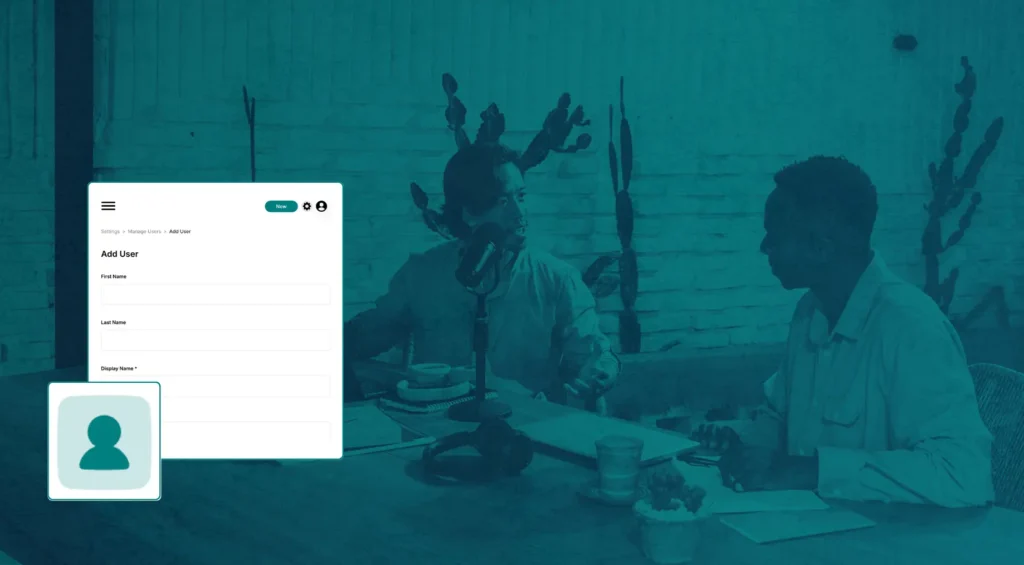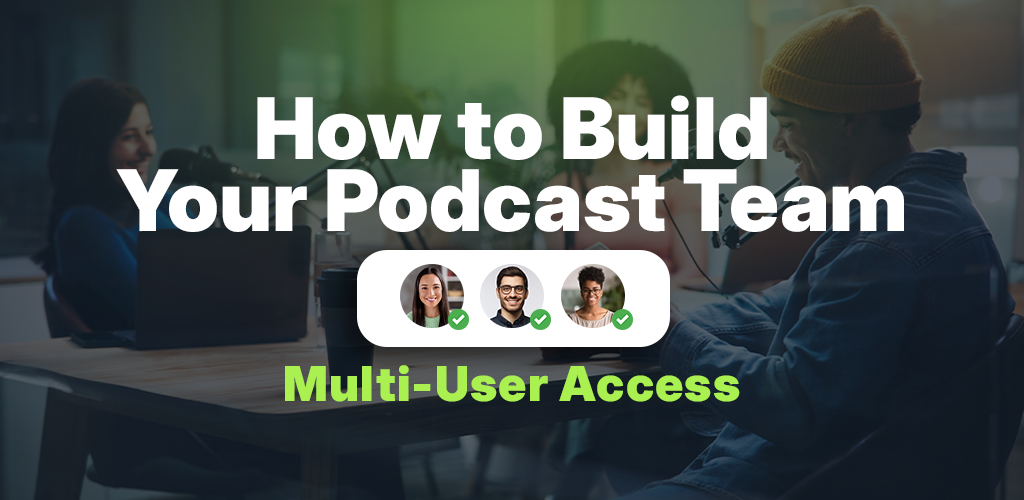Podcasting often starts as a passion project – just you, a microphone, and a great idea. But as your podcast grows, you quickly realize that being a podcaster means wearing many hats and includes multiple roles: podcast host, podcast producer, audio editor, podcast coordinator, content marketer, and graphic designer, all at once. It can be overwhelming, but you don’t have to do it all alone.
Bringing on a co-host or simply a professional producer can be the first step in delegating responsibilities within podcast production. But what do experienced podcast producers do? And if you are just in front of the mic, can you be both a podcast producer and a podcast host? And how can tools like Libsyn’s Multi-User Access help?
What Does a Podcast Producer Do?
First off, it goes without saying that yes, a podcast host and a podcast producer can be, and often are, the same person. A podcast producer serves a vital role both in front of the mic and behind-the-scenes. Here are some common tasks that a podcast producer may undertake:
Organizing the overall podcast’s production calendar and defining the topics for recording upcoming episodes.
Scheduling recording sessions between a podcast production company, the host, and co-hosts.
Booking podcast guests and coordinating with potential sponsors and advertisers.
Researching topics within the podcast’s niche that align with the goals of the podcast and the podcast listeners.
Serving as project management for the podcast; keeping track of both the release of a new episode along with promotional content that is published on social media.
Podcast producers’ work often means wearing many hats, and the responsibilities can extend even beyond the tasks listed above to include roles like content marketer or audio editor. The significant time commitment required for these varied tasks means even a professional podcast producer may start feeling the strain, especially if you are also the host.
If this sounds like you, it’s time to think about scaling your podcast by investing in a podcast team. But what does building a podcast team actually look like and how do manage them?
How Do You Manage Your Podcast Team?
As you begin thinking about growing your podcast team, it’s natural to worry about how they’ll access everything you’ve built or whether you’ll need to upgrade the tools you use to create your podcast. Using a podcast hosting service that supports multiple users is one of the best starting points for building a team—even if it’s just you and a co-host right now. At Libsyn, every account and plan includes the ability to add up to five users. Good news, if you are hosting with Libsyn you can do that now! You can read more about this feature and how it works further down in the article.
To see just how easy it is to set up and use Multi-User Access, check out the video above. It will walk you through the process inside the Libsyn Dashboard.
The Different Types of Podcast Teams
Not all podcast teams are built the same way. Where you are in your podcast journey and which areas of the podcast production process you are struggling with will dictate the size and complexity of your podcast team. It’s also okay if you’re just starting a podcast and not ready to build a team yet—but looking ahead can help you design workflows that are easy to hand off later.
A small podcast team may include as little as one or two additional podcast roles. In this setup, you may be the podcast host on mic and also the podcast producer of your own podcast, handling tasks like the production schedule and booking podcast guests. You would then manage another podcast team member who is responsible for the post production process, focusing on the technical aspects including audio editing of the podcast episodes.
A larger podcast team often includes multiple experienced podcast producers who work closely with podcast coordinators, audio engineers and the podcast hosts. Their collective goal is to craft engaging, high-quality podcast episodes. This collaborative production process also extends to creating the promotional content and marketing assets for each new episode.
Ultimately, the size of your podcast team may vary depending on the budget and goals of your podcast. The job of the producer is to take a hard look at the goals of the podcast and define where it makes sense to add additional vital roles within the production that not only save money and time but also deliver high quality content.
For a real-life blueprint, we asked Andrea Klunder, founder of the podcast production agency The Creative Impostor Studios and host of the Podcast Envy podcast, to share her method for managing a podcast team. The simple podcast production workflow she provided is perfect for a solo podcast producer ready to build their own podcast team and streamline production management.

A Real-Life Podcast Producer's Podcast Team Workflow, with Andrea Klunder
To scale successfully, you need a coordinated system. Here’s a breakdown of the workflow Andrea uses, reframed for a podcast producer collaborating with an audio editor and a project manager.
Step 1: The Podcast Producer Provides the Raw Material
The process begins when you, the podcast producer or podcast host, have finished recording. You then provide the raw audio files to your podcast team via a shared service like Dropbox.
Step 2: The Audio Editor Works Their Magic
The audio editor takes the recording of the raw files and begins their part of the production process, shaping your thoughtful content into a coherent podcast episode while managing sound quality. The responsibilities include:
Editing the episode’s audio files for clarity and flow during post-production using professional audio editing software like Adobe Audition.
Handling the creative and technical aspects of sound design by adding music, sound effects, and other audio content that supports the story.
Ensuring the final quality of the episode by performing crucial technical tasks, including leveling the initial recording for consistent sound quality, adding metadata like ID3 tags, and doing a final quality assurance listen to make sure the entire file sounds good.
Uploading the finished podcast episodes back to the shared Dropbox for the project manager to access.
Using automated transcription tools, often built directly into audio editing software, to create a transcript of the episode for use in promotional content or a blog post.
Ultimately, a skilled audio editor brings a blend of creative instincts and sharp technical skills to the post-production process. They essentially serve as your personal secret weapon, responsible not just for the narrative flow but the overall sound quality and professional polish of the final podcast episode. Their work is what elevates a simple recording into a high-quality listening experience that your audience will appreciate.
Step 3: The Project Manager Takes the Baton
Once the podcast episode is ready, the project manager steps in. This role is like a podcasting Swiss Army knife, handling all the final details to get the episode live on all the online platforms.
Here’s what they do:
-
- Gather all assets: The project manager grabs the finished audio file from Dropbox and the completed show notes (which may have been written by you or another team member) from a shared Google Drive.
-
- Prepare for publishing: They create a shorter summary specifically for the podcast description in Libsyn. Andrea notes that her team utilizes stored snippets in Libsyn for recurring information, like footer links, to save time.
-
-
- Upload and schedule: The project manager uploads the audio file and show notes into your Libsyn account and schedules the episode for its release based on the podcast schedule.
-
- Handle social media and promotion: The project manager can shorten the show notes even further to create a social media blurb or assist in the creation of an episode blog post.
- Post-publishing check: The day after publishing, the project manager checks online platforms like Apple Podcasts, Spotify, and YouTube to ensure the episode has been published correctly and troubleshoots any issues.
-
Podcast Monetization Management
If you’re also wondering how creators handle monetization and podcast advertising, this could falls under the project manager’s role. They might be responsible for adding ad markers after episodes are published or coordinating with your platform’s advertising team. At Libsyn, we offer both Programmatic Podcast Advertising and Host-Read Advertising. While many creators manage this directly through the Libsyn interface or by working with our teams, it can also be the perfect opportunity for a project manager to step in and take the lead.

Collaborate Without Complications: The Libsyn Solution
Managing a podcast team can get complicated, especially when it comes to sharing login credentials with multiple podcast coordinators, audio editors, podcast producers or podcast co-hosts. This is where Libsyn’s Multi-User Access feature changes the game.
With Multi-User Access, you can securely invite up to five users to help with the project management of your podcast without ever sharing your personal password. Each podcast team member gets their own login, giving them the access they need to do their job efficiently while keeping your account secure. Here’s how it streamlines the podcast production workflow we just discussed:- Your audio editor and podcast producer can be given direct access to upload and schedule new episodes.
- Your project manager or operations assistant can log in to write descriptions, manage publishing, and review stats.
- You remain in control. Additional users are restricted from accessing billing-related features, so they can’t change your plan, cancel your show, or enroll in podcast ad programs.
Quick Tip: Need help getting started? Check out our support articles to learn how to manage your podcast team in your Libsyn account today! ▶️ Or watch this quick video.
Frequently Asked Questions About Building a Podcast Team
Podcasters often ask us questions about building a podcast team. Here are a few common questions we hear from producers.
What is the main difference between a podcast producer, a podcast host and a podcaster?
While these terms are sometimes used interchangeably in the podcasting industry, they often refer to distinct roles. Think of it this way:
A “podcaster” is a general term for someone who creates a podcast. They are often a passionate creator who handles all aspects of their own podcast, from idea to execution. It’s a title many creators use to identify themselves.
A podcast producer is often considered a more professional title that focuses on the operational side of the production. The producer’s job is to manage the entire workflow, including planning the production calendar, researching topics, booking guests, and scheduling recording sessions. A professional producer ensures the final episode is of high quality. While a host can certainly be their own producer, a dedicated podcast producer may also be a behind-the-scenes professional who manages multiple podcasts but is never on the microphone.
A podcast host is the on-mic talent and the literal voice of the podcast. They are the front-facing personality that the audience connects with. While a host might be responsible for preparing scripts or research for their recording, their primary role is to guide the conversation during the episode. It’s important to note that one person can be all three, a podcaster who acts as the host and producer for their own show.
When should I hire a professional producer for my own podcast?
While there’s no single right answer, the best time to consider hiring a professional producer is when the time commitment of managing the production starts to interfere with your ability to create high-quality content.
Here are a few common signs that it might be time to get help:
You feel overwhelmed. If the logistics of your podcast’s production, scheduling, editing, and promotion, are keeping you from the creative side of podcasting, a producer can take over those tasks. The primary producer’s job is to free you up to focus on being the host and voice of your show.
Your show is growing. This often happens when you increase your publishing schedule (e.g., from a monthly to a weekly episode) or when the podcast becomes more popular, leading to new duties like managing sponsor relationships.
You want to expand. If you’re thinking about starting a second podcast, a professional producer is essential for managing multiple roles and workflows to ensure both productions run smoothly.
Do I need both an audio editor and an audio engineer?
For the majority of podcasts, a skilled audio editor is all you will need. An experienced editor possesses the technical skills to cover both roles, managing sound quality throughout the entire post-production process to ensure you deliver a high-quality episode.
The main difference is when their work happens. An audio editor primarily works with the audio files after the recording is complete.
An audio engineer (or sound engineer), on the other hand, is most valuable during the recording sessions. They manage the hardware, software, and microphone setups in real-time to capture the best possible sound from the start. An engineer is a great addition for more complex productions, such as video podcasts being produced in a professional studio or running a live podcast event.
For most producers building a team for their own podcast, a talented audio editor is the perfect place to start.
How can I save money when first building a podcast team?
The key to saving money when first building your team is to start small. You don’t need to hire for all podcast roles at once; often, bringing on just one person can make a huge difference.
Instead of just thinking about what you enjoy the least, approach it as a time audit. Analyze your production process and identify the tasks that have the lowest return on your time investment. Are you spending hours on administrative work like booking guests or formatting show notes? Outsourcing these specific, time-consuming tasks is often the most cost-effective first step.
Many of these organizational tasks don’t require the deep technical skills of audio editing. You can often hire a virtual assistant or a project manager to handle them. For many creators, hiring a podcast producer to manage the overall production is the most cost-effective first step, as it frees you up to focus on hosting and creating high-quality content.
It’s easy to feel overwhelmed by all the moving parts of podcast production. If you’re already thinking, “I’m burnt out just reading this,” don’t worry—you don’t have to do it alone. You can start by adding a few team members to your Libsyn account today and take the first step toward sharing the load.
Start Building Your Dream Team Today
Moving from a solo operation to a team-based workflow is a game-changer for any podcast producer looking to scale. By delegating key post production tasks, you reclaim your sanity and free up time to focus on the creative side of podcasting. Even bringing on just one team member can dramatically improve your show’s consistency, helping you create high quality content and grow your audience.
Ready to build the team that will help you tell your story?



